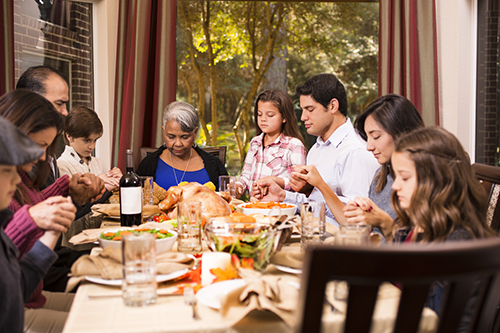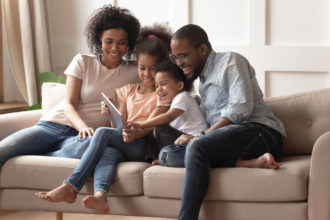While sparkly trees and visits from Santa are a yearly tradition for many at this time of year, things aren’t quite so straightforward for mixed-faith families. When parents come from different religious backgrounds, they often celebrate the holidays in a variety of different ways.
For Anna Keller, December is filled with festivities that encompass her Jewish heritage and the Mexican-Catholic upbringing of her partner, Adrian Castañeda. “[Before we had our daughter] we didn’t discuss holidays, but we did discuss two cultures and two religions”.
The arrival of baby Helen last October meant the couple had to decide things quickly. “For Adrian, Judaism is very confusing,” says Keller. “He’s pretty willing to do the holidays but he isn’t sure what they signify and a lot of it doesn’t make sense to him. His traditions are more straightforward.”
Come December, things unfolded pretty naturally. “We’re 50-50 in our house and so there was a lot of food involved,” she says. “For Mexicans, Dec. 12 Our Lady of Guadalupe Day is bigger than Christmas. We usually eat traditional Mexican food like barbacoa and tortillas.” For Hanukkah, the family heads to Anna’s mother’s house around the corner each night to make latkes, eat a big dinner and light the menorah. Moving forward, the couple plan to keep celebrating both holidays equally.
For Kimberly Davis*, a lot of questions about religion came up while planning her wedding. She was raised Jewish and her husband Catholic. “The lessons I learned then, I’ve definitely applied to holidays!”
The most important thing for her has been ensuring Christmas and Hanukkah don’t get lost in each other, especially when the dates overlap. “When [our twins] were younger they had difficulty distinguishing between the two festivities, so we set up Hanukkah decorations in one room, and Christmas in another”.
Davis also wanted there to be balance, so that Hanukkah would never seem like the ‘lesser’ holiday. To celebrate, the family has a big annual party with dreidels, donuts and latkes. “After Hanukkah is over, we take down the decorations and start setting up the tree for Christmas,” she says. “This was important to my husband. The kids decorate, we do presents, we put cookies on a platter and Santa comes.”
But you won’t find any nativity scenes at their house, “Christmas isn’t a religious holiday for us, it’s secular.” Her advice to other mixed-faith families? “Have a respectful and open relationship with each other so no one feels their culture has been pushed to the side”.
Rabbi Keara Stein, Director of InterfaithFamily, Los Angeles agrees. “If you can talk about religion in a relationship, you can talk about anything! It really sets the groundwork for the rest of the year.”
Rabbi Stein also suggests that couples ask each other why certain traditions are important. “Going into any holiday with intention makes it less confusing.” Often issues arise with extended family members who aren’t on the same page. “A child marrying someone from a different faith can be seen as threatening and all of those feelings will come up at holidays.”
The best thing you can do is invite them to gatherings—food is a non-threatening way to do this—but be respectful and understanding if they prefer not to attend. “Kids often have a much clearer understanding than adults do,” says Rabbi Stein. “They don’t have 30-plus years of baggage.”
She recommends asking children how they want to celebrate the holidays. “Coming together is a beautiful tradition in December. Teaching children that religion is something that adds to their life, not takes away from it, is a strong element in building identity and religious association.” Amen to that.
Editor’s note: * Indicates that names have been changed for privacy.
Marianne Wisenthal is a lifestyle writer, digital content producer, mum and city-gal living life in Toronto, Ontario.





